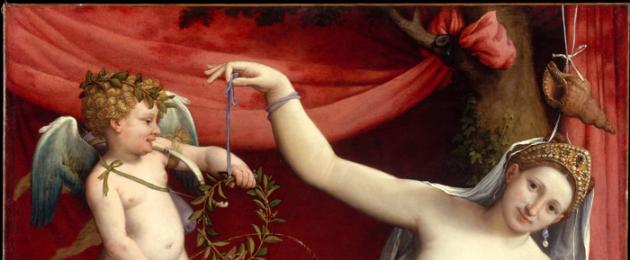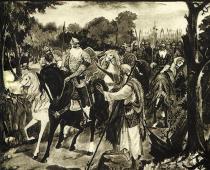Cupid (Eros, Eros, Cupid)
Cupid (Chaudet Antoine Denis)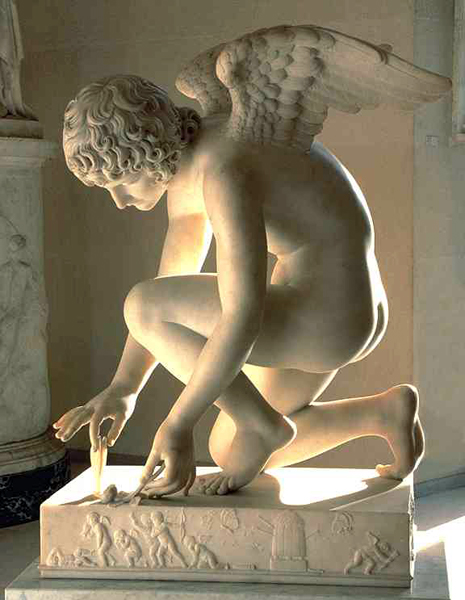
Material from Wikipedia
Eros(Eros, other Greek. Ἔρως
, also Eros, Cupid, among the Romans Cupid) is the god of love in ancient Greek mythology, the inseparable companion and assistant of Aphrodite, the personification of love attraction, which ensures the continuation of life on Earth.
Origin
Lorenzo Lotto - Cupid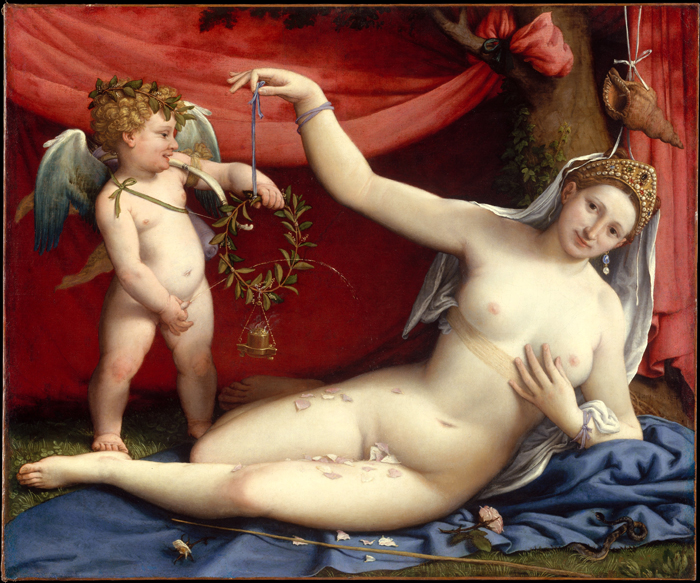
There were many options for the origin of Eros:
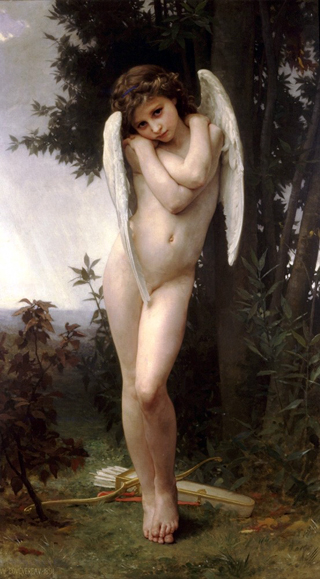 * Hesiod considers him a self-generated deity after Chaos, Gaia and Tartarus, one of the most ancient gods.
* Hesiod considers him a self-generated deity after Chaos, Gaia and Tartarus, one of the most ancient gods.
* According to Alcaeus, son of Zephyr and Iris.
* According to Sappho, son of Aphrodite and Uranus.
* According to Simonides, son of Ares and Aphrodite.
* According to Acusilaus, the son of Erebus and Nikta.
* According to Orphic cosmogony, he was born from an egg laid by the Night or created by Chronos. It is called the great daimon.
* According to Ferekid, Zeus became Eros as a demiurge.
* According to Parmenides, the creation of Aphrodite.
* According to Euripides, the son of Zeus, or Zeus and Aphrodite.
* According to Pausanias, son of Ilithyia.
* Plato has the son of Poros and Penia.
* Son of Chaos.
* According to some version, the son of Gaia.
* His father was also called Kronos, Orpheus, etc.
Diana Disarming Cupid
(Pompeo Batoni, Metropolitan Museum)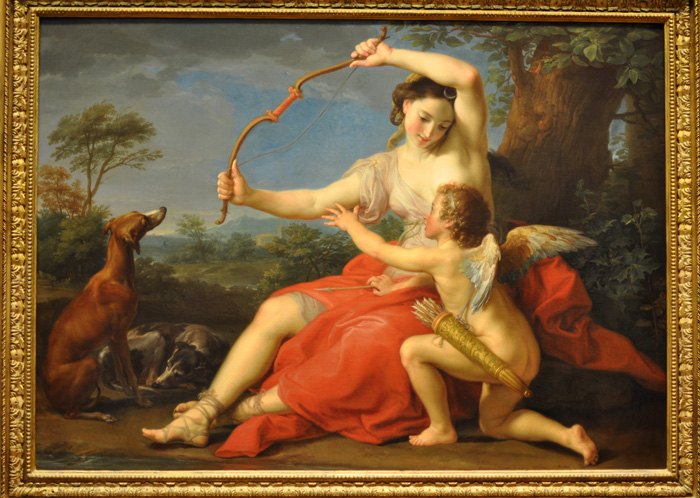
According to Cotta's speech, there were three:
* Son of Hermes and the first Artemis.
* Son of Hermes and the second Aphrodite.
* The son of Ares and the third Aphrodite, he is Anteros.
According to Nonnu, he was born near the city of Beroi.
Main myths
Everything submits to love (Cupid)
Caravaggio, 1602 (Amor Vincit Omnia)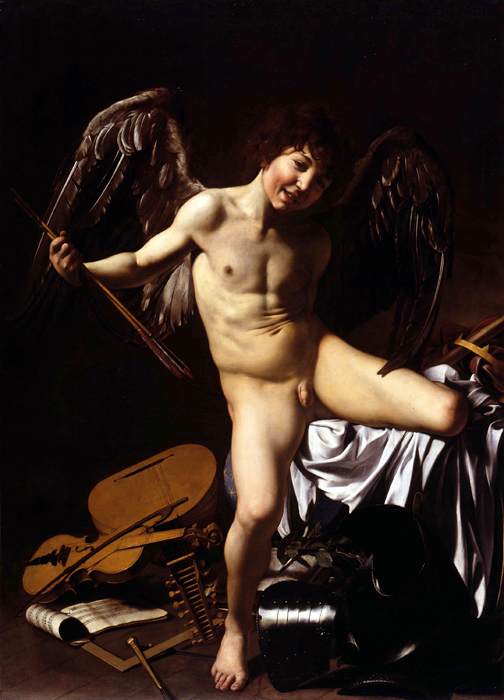
Eros- the world deity, connecting the gods into marriage couples, was considered a product of Chaos (dark night) and a bright day or Heaven and Earth. He dominates both external nature and the moral world of people and gods, controlling their heart and will. In relation to the phenomena of nature, he is the beneficent god of spring, fertilizing the earth and bringing new life into being. He was represented as a beautiful boy, with wings, in more ancient times - with a flower and a lyre, later with arrows of love or a flaming torch.
In Thespiae, every four years, a festival was held in honor of Eros - Erotidia, accompanied by gymnastic and musical competitions.
Young girl protecting herself from Eros
(Adolphe William Bouguereau, 1880)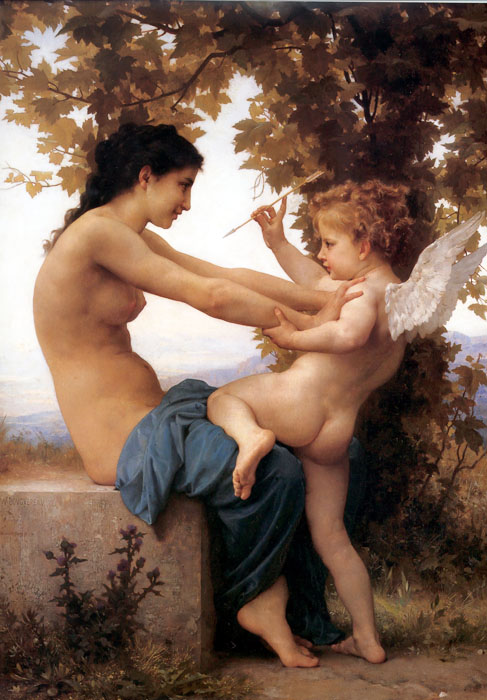
In addition, Eros, as the god of love and friendship that united boys and girls, was revered in gymnasiums, where the statues of Eros were placed next to the images of Hermes and Hercules. Spartans and Cretans usually sacrificed to Eros before the battle. His altar stood at the entrance to the Academy.
Erostasia. Aphrodite and Hermes weigh Love (Eros and Anteros)
on the golden scales of fate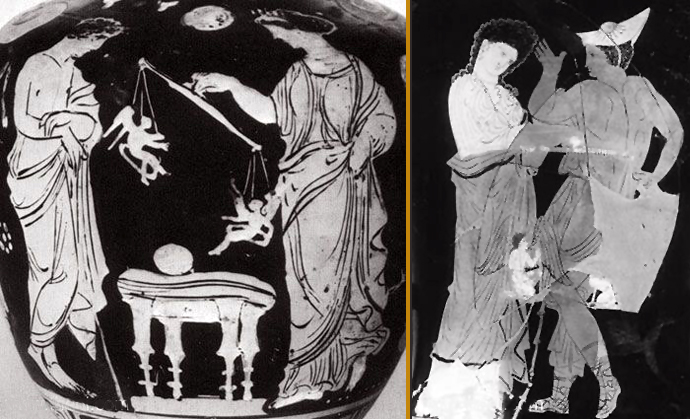
The mutual love of youth found a symbolic image in the group of Eros and Anteroth (otherwise Anterot, Anteros), located in the Eleatic gymnasium: the relief with this group depicted Eros and Anterot, contesting the palm of victory from each other. Ovid mentions "both Eros". The nurses of Eros the Charites went to Delphi to Themis with a question about his small stature.
In art
Cupid as a child
(worker Etienne Maurice Falcone, after 1757, Hermitage)
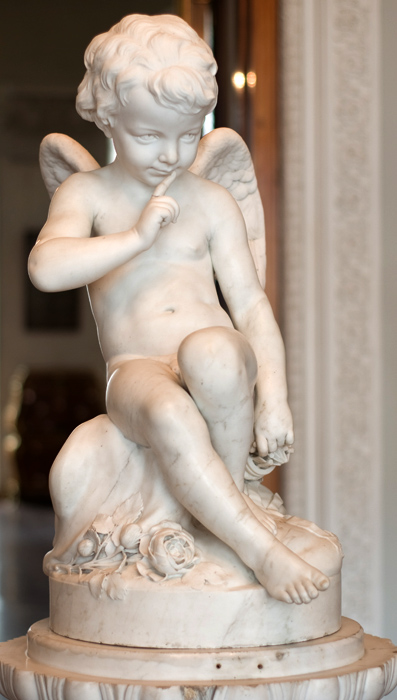
Eros served as one of the favorite subjects for philosophers, poets and artists, being for them an eternally living image of both a serious world-ruling force and a personal heartfelt feeling that enslaves gods and people. The LVIII Orphic hymn is dedicated to him. The emergence of the group of Eros and Psyche (that is, Love and the Soul captivated by it) and the well-known folk tale that developed from this representation belongs to later times.
The image of Cupid in the form of a naked child is used when painting ceilings, and furniture is rarely decorated with the image of Cupid.
Eros (Cupid, Cupid)
Eros (Musei Capitolini) 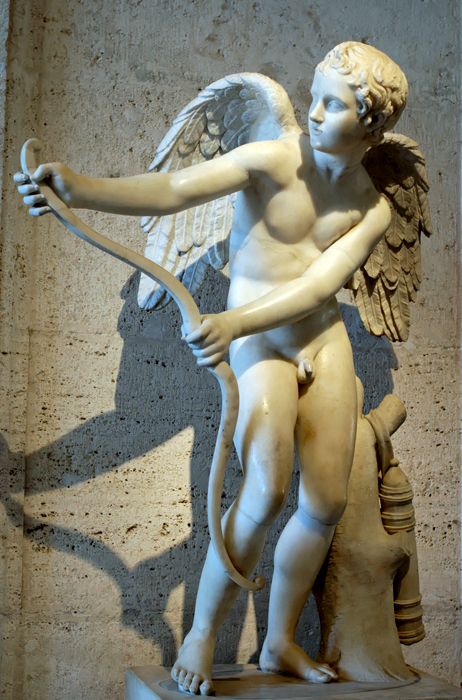
This god of love ("Eros" - love) is usually depicted as a frisky, playful boy, armed with a bow and arrow. The wounds inflicted by them are not fatal, but can be painful, excruciating, although they often cause a sweet feeling or bliss of quenched passion.
Venus, Cupid and Satyr (Bronzino)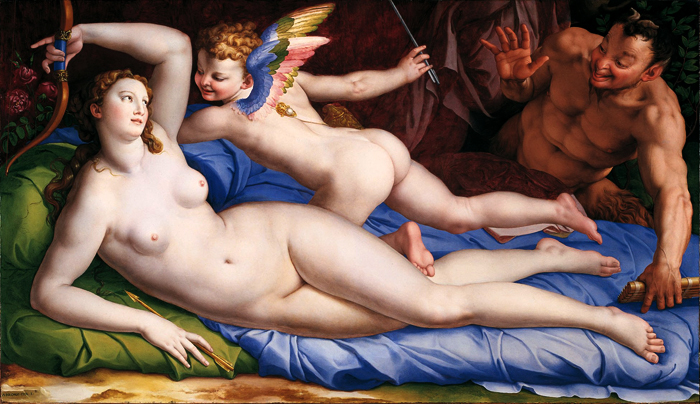
The ancient Greeks considered Eros to be a god not born, but eternal, on a par with Chaos, Gaia and Tartarus. He personified a powerful force that attracts one living being to another, giving pleasure, without which they cannot exist and copulate, giving birth to more and more new individuals, neither gods, nor people, nor animals. Eros is the great force of attraction between the two sexes, the force of the universal gravitation of love.
But there was another version of its origin, later. According to this version, Eros is the son of Aphrodite and Hermes or Ares, or even Zeus himself. There were other assumptions about the parents of Eros. At the same time, the poets agreed on one thing: the god of love always remains a child and sends his golden smashing arrows arbitrarily, regardless of the arguments of reason.
Hesiod wrote:
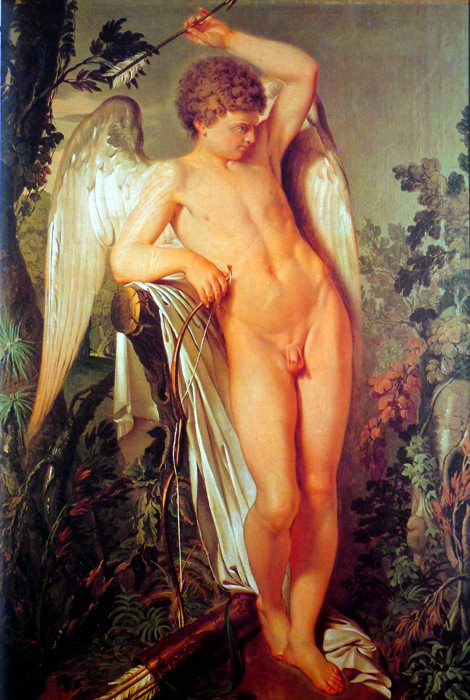 And, among all the gods, the most beautiful - Eros. Sweet-smelling - for all the gods and earthly people, he conquers the Soul in the chest and deprives everyone of reasoning.
And, among all the gods, the most beautiful - Eros. Sweet-smelling - for all the gods and earthly people, he conquers the Soul in the chest and deprives everyone of reasoning.
Philosophers did not limit the area of Eros' dominion to gods, people and animals. The ancient Greek thinker Empedocles believed that in nature either Love or Enmity wins in turn, and the first brings everything into unity, defeating Enmity. Thus, Eros becomes the personification of the cosmic forces of unity, the aspiration to merge. Thanks to him, the fabric of life is not interrupted and the unity of the universe is preserved.
However, in ancient texts, Eros often acts as a force that awakens a primitive "animal" passion. According to Plato, Eros “is always poor and, contrary to popular belief, is not at all handsome and gentle, but rude, untidy, unshod and homeless; he is lying on the bare ground under the open sky, at the door, on the street ... ”However, a caveat follows: it turns out that Eros is drawn to the beautiful and perfect, brave and strong; he is wise and ignorant, rich and poor.
According to Diogenes Laertes, the Stoics argued: “Lust is an unreasonable desire ... Love is a desire that is not befitting worthy people, because it is an intention to get close to someone because of conspicuous beauty.” And Epicurus clearly shared: “When we say that pleasure is the ultimate goal, we do not mean pleasures that consist in sensual pleasure ... but we mean freedom from bodily suffering and mental anxieties. No, it is not continuous drinking and drinking, not the enjoyment of boys and women ... give rise to a pleasant life, but sober reasoning, exploring the reasons for every choice ... and expelling [false] opinions that produce the greatest confusion in the soul.
Cupid and Psyche 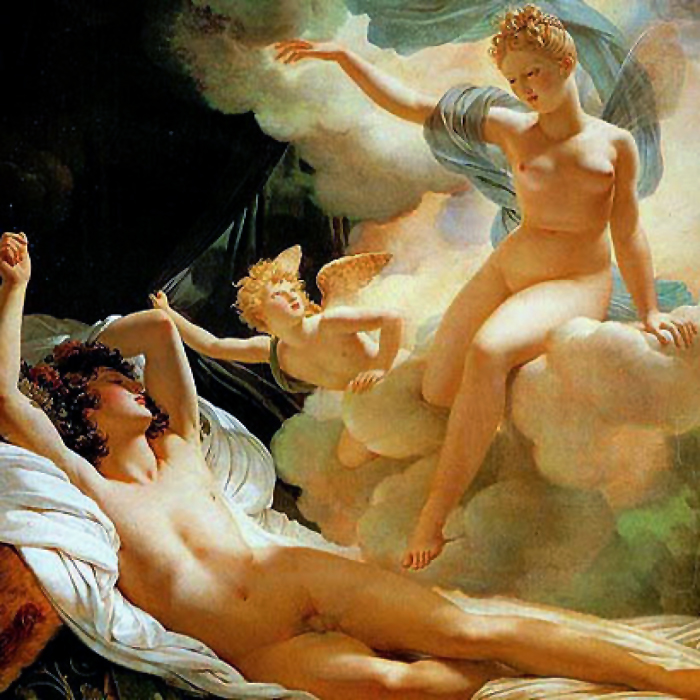
In ancient Rome Eros (Cupid) got a name Cupid ("Love") and became especially popular. Apuleius created a legend that tells about the desire of the human soul in the form of Psyche (“psyche” - soul) to find Love. “With the help of Zephyr,” writes A.F. Losev, retelling the legend, - Amur received the royal daughter Psyche as his wife. However, Psyche broke the ban never to see the face of her mysterious husband. At night, burning with curiosity, she lights a lamp and gazes admiringly at the young god, not noticing the hot drop of oil that has fallen on Cupid's delicate skin. Cupid disappears, and Psyche must get him back after going through many trials. Having overcome them and even descended into Hades for living water, Psyche, after excruciating suffering, regains Cupid, who asks Zeus for permission to marry his beloved and reconciles with Aphrodite, who viciously persecuted Psyche.
What is the hidden meaning of this story? It can be assumed that it tells about the "blindness" of the initial love attraction, caused by unconscious emotions. The attempt of reason to understand the essence of love leads to the fact that it disappears. There are painful doubts, experiences, conflicts: this is how feelings take revenge on reason for invading their kingdom. But true love overcomes these obstacles and triumphs - already forever.
Just over two millennia ago, the Roman poet Publius Ovid Nason described Cupid's triumph as follows:
Oh, why does the bed seem so hard to me,
And my bedspread does not lie well on the sofa?
And why did I spend such a long night sleepless,
And, restlessly spinning, the body is tired, hurts?
I would feel, I think, if I were tormented by Cupid,
Or has a sly one crept up, harming with hidden art?
Yes it is. Already in the heart there are thin-sharp arrows;
Having subdued my soul, the fierce Cupid torments...
Yes, I admit, Cupid, I became your new prey,
I am defeated and I betray myself to your power.
The battle is not needed at all. Mercy, I ask for peace.
You have nothing to boast about; I, unarmed, broken...
Your fresh catch is me, having received a recent wound,
In a captive soul I will carry a load of unusual shackles
A sound mind from behind with hands in chains will lead you,
Shame, and everything that harms mighty Love...
Your companions will be Madness, Caress and Passion;
They will stubbornly follow you all in a crowd.
With this army you constantly humble people and gods,
If you lose this support, you will become powerless and naked ...
Cupid (Cupid, Eros) was sung by poets at all times; philosophers talked about it. It turned out that this deity has not one or two, but many guises, although high Eros, like any peak, is far from accessible to everyone: one must be worthy of it.
Series of messages " ":
Part 1 - Myths and Legends * Cupid (Eros, Eros, Cupid)
- In contact with 0
- Google+ 0
- OK 0
- Facebook 0

